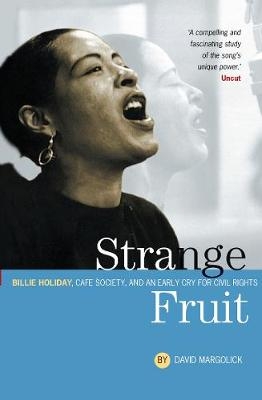
Strange Fruit: Billie Holiday, Café Society And An Early Cry For Civil Rights
Seiten
2002
|
Main
Canongate Books (Verlag)
978-1-84195-284-0 (ISBN)
Canongate Books (Verlag)
978-1-84195-284-0 (ISBN)
Billie Holiday's signature tune, 'Strange Fruit', with its graphic and heart-wrenching portrayal of a lynching in the South, brought home the evils of racism as well as being an inspiring mark of resistance. In 1939, its performance sparked controversy (and sometimes violence) wherever Billie Holiday went.
The story of the song that foretold a movement and the Lady who dared sing it.
Billie Holiday's signature tune, 'Strange Fruit', with its graphic and heart-wrenching portrayal of a lynching in the South, brought home the evils of racism as well as being an inspiring mark of resistance.
The song's powerful, evocative lyrics - written by a Jewish communist schoolteacher - portray the lynching of a black man in the South. In 1939, its performance sparked controversy (and sometimes violence) wherever Billie Holiday went. Not until sixteen years later did Rosa Parks refuse to yield her seat on a Montgomery, Alabama bus. Yet 'Strange Fruit' lived on, and Margolick chronicles its effect on those who experienced it first-hand: musicians, artists, journalists, intellectuals, students, budding activists, even the waitresses and bartenders who worked the clubs.
The story of the song that foretold a movement and the Lady who dared sing it.
Billie Holiday's signature tune, 'Strange Fruit', with its graphic and heart-wrenching portrayal of a lynching in the South, brought home the evils of racism as well as being an inspiring mark of resistance.
The song's powerful, evocative lyrics - written by a Jewish communist schoolteacher - portray the lynching of a black man in the South. In 1939, its performance sparked controversy (and sometimes violence) wherever Billie Holiday went. Not until sixteen years later did Rosa Parks refuse to yield her seat on a Montgomery, Alabama bus. Yet 'Strange Fruit' lived on, and Margolick chronicles its effect on those who experienced it first-hand: musicians, artists, journalists, intellectuals, students, budding activists, even the waitresses and bartenders who worked the clubs.
David Margolick is a contributing editor for Vanity Fair. Prior to that, he was the national legal affairs correspondent for the New York Times. He has written four books: Undue Influence: The Epic Battle for the Johnson & Johnson Fortune, At the Bar: Passions and Peccadillos of American Lawyers (a collection of his law columns for the New York Times), Strange Fruit and Beyond Glory: Joe Louis vs. Max Schmeling, and a World on the Brink. He has been nominated four times for the Pulitzer Prize. He lives in New York City.
| Erscheint lt. Verlag | 4.7.2002 |
|---|---|
| Vorwort | Hilton Als |
| Verlagsort | Edinburgh |
| Sprache | englisch |
| Maße | 129 x 198 mm |
| Gewicht | 123 g |
| Themenwelt | Literatur ► Biografien / Erfahrungsberichte |
| Kunst / Musik / Theater ► Musik ► Jazz / Blues | |
| Geschichte ► Allgemeine Geschichte ► 1918 bis 1945 | |
| Geschichte ► Allgemeine Geschichte ► Zeitgeschichte | |
| Geisteswissenschaften ► Geschichte ► Regional- / Ländergeschichte | |
| Sozialwissenschaften ► Politik / Verwaltung | |
| Sozialwissenschaften ► Soziologie | |
| ISBN-10 | 1-84195-284-2 / 1841952842 |
| ISBN-13 | 978-1-84195-284-0 / 9781841952840 |
| Zustand | Neuware |
| Haben Sie eine Frage zum Produkt? |
Mehr entdecken
aus dem Bereich
aus dem Bereich
ein Psychologe erlebt das Konzentrationslager
Buch | Hardcover (2024)
Kösel (Verlag)
CHF 30,80
Mythos „Stauffenberg-Attentat“ – wie der 20. Juli 1944 verklärt und …
Buch | Hardcover (2024)
Goldmann (Verlag)
CHF 33,55


